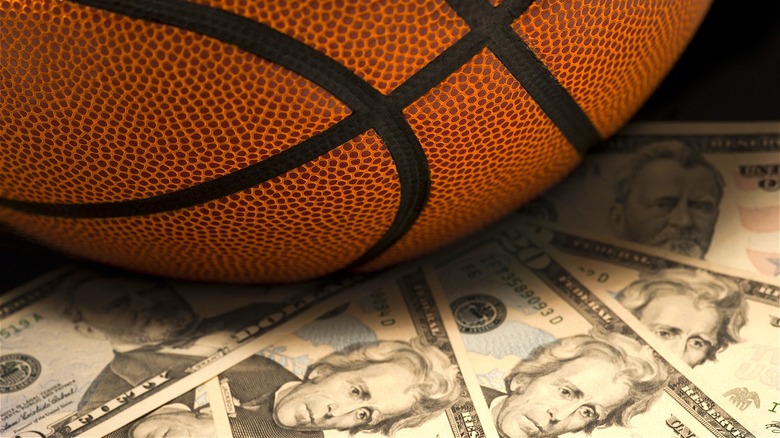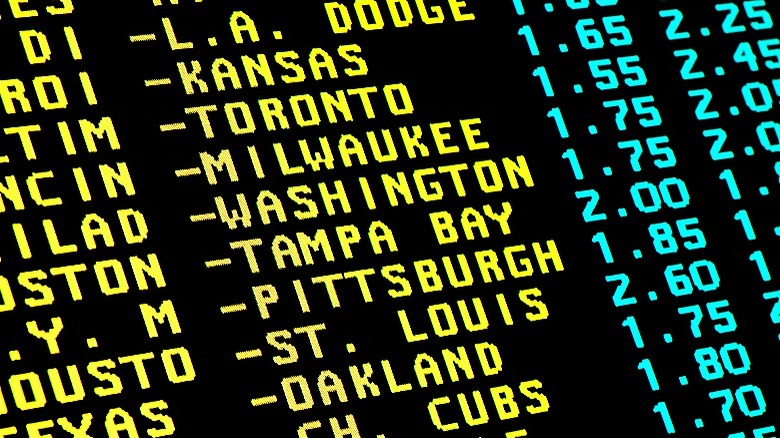How Sports Betting Impacts The Economy
Even though sports betting in the United States has only been legal for a few years now, it's already taken the country by storm. According to a 2022 Pew Research Center survey, 19% of U.S. adults reported having personally bet money on sports in some way in the 12 months prior. For those who might not already know, in 2018, the Supreme Court repealed a 1992 law known as the Professional and Amateur Sports Protection Act (or PASPA), which had kept legalized sports betting centered only in Nevada. Repealing this law paved the way for legalized sports betting in states that wanted it, and so far that has been a LOT of states (38 states, and the District of Columbia, to be exact).
In 2023, Americans legally wagered $120 billion just on sports betting. This was not only an incredible 27.5% increase over 2022 numbers, but the rise in sports betting popularity shows no signs of stopping. Super Bowl LVIII broke sports betting records in early 2024, and betting has already taken off for the upcoming NBA Finals. While sports betting can lead to financial success for bettors, individual wins are only a smart part of the larger economic impacts of the entire industry. While the gambling industry contributes to the larger economy through taxes and job creation, it also has the potential to harm the economy through a rise in problem gambling. Let's dive into the economic impact of sports betting, and see if it's really as positive for society as the industry would like you to believe.
How betting helps the economy
For starters, figuring out how exactly sports betting affects the economy can be complicated. According to the American Gaming Association, the gaming industry as a whole (including casinos and in-person gaming, as well as apps and sports betting) contributed $328.6 billion to the U.S. economy in 2023. AGA's president and CEO, Bill Miller explained how they determined their economic impact, "The U.S. gaming industry delivers long-term growth and impact to communities, generating significant tax revenue, creating strong jobs, supporting local small businesses, and funding critical community priorities." The AGA cited the $53 billion paid in federal, state, and local taxes (including $13.5 billion in gaming taxes) as a big part of how the industry positively impacted the economy.
The industry also lauds its employment numbers as a positive impact. According to the AGA, the gaming industry employs more than 700,000 people across the country, making it a larger employer than industries like the postal service or air travel. The labor income of these jobs also helps to contribute to the economy since paid employees are able to spend in the economy. This then keeps up demand and fuels economic growth, which leads to a cycle with more jobs and (in theory) more money for employees. However, according to data from the Bureau of Labor Statistics, not all of these employees are exactly earning livable wages. The annual average for gambling dealers in 2023 was $40,030. Meanwhile, the average annual salary in the U.S. is $63,795.
How betting can hurt the economy
While tax revenue and job creation are important, it's also important to assess the economic costs of gambling. According to the National Council on Problem Gambling, the social cost of problem gambling is estimated to be $14 billion between criminal justice, health care spending, job loss, bankruptcy, and other financial consequences of people gambling beyond their means. According to a recent survey from St. Bonaventure/Siena Research, of the 39% of men (aged 18–49) who reported sports betting, 38% of them also reported betting more than they felt they should have. Even more troubling were the 19% who reported having lied about the extent of their betting, and the 18% who bet and lost money meant for other financial obligations.
Don Levy, the Siena College Research Institute's director, also reported that "nearly 40% of bettors have felt ashamed about their gambling [while] over half have chased a bet, that is, increased the amount they bet in hopes of getting money back after a loss, and 22% have had someone express concern to them about their usage of online sportsbooks." It's worth noting that gambling hotlines in states that have legalized sports betting have received noticeable increases in calls after legalization. For instance, in Ohio's first year of legalized sports betting (2023), the Problem Gambling Network of Ohio experienced a 55% increase in calls. However, Levy reported, "Still, only 9% of bettors have called a problem gambling hotline or sought help." Make sure you know what to do if you know someone with a gambling problem.


